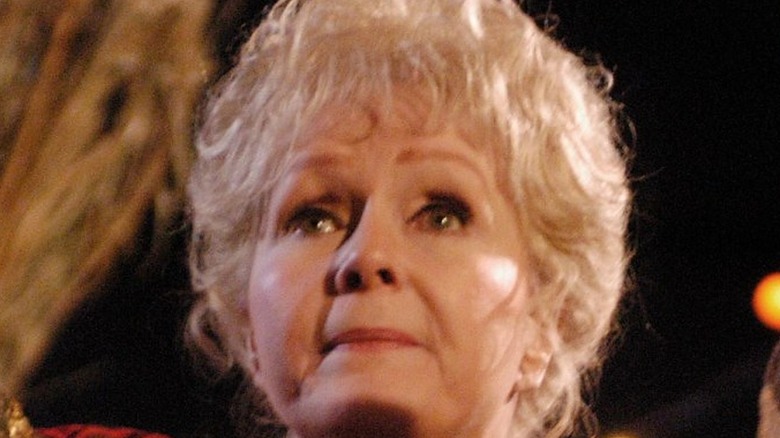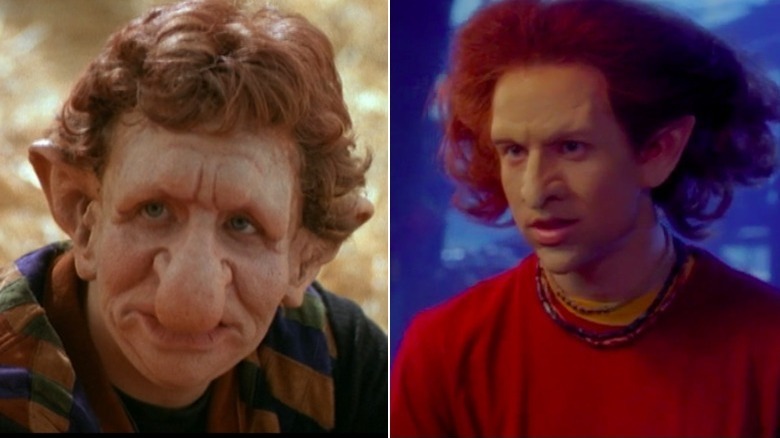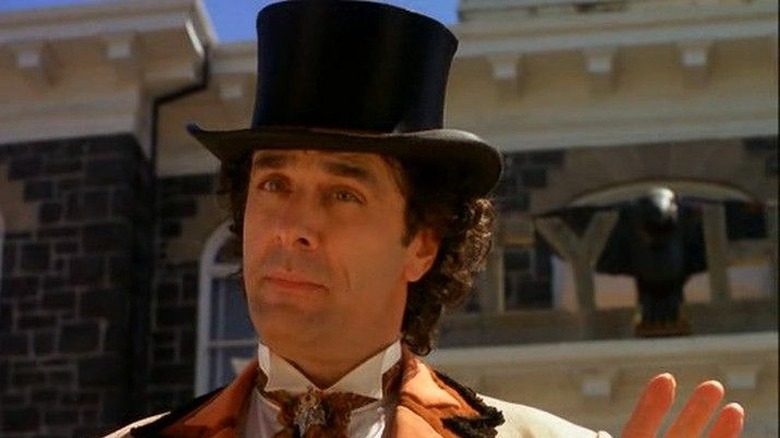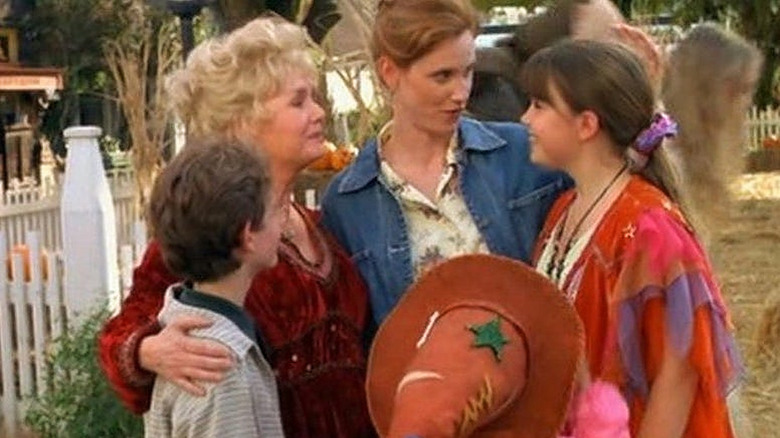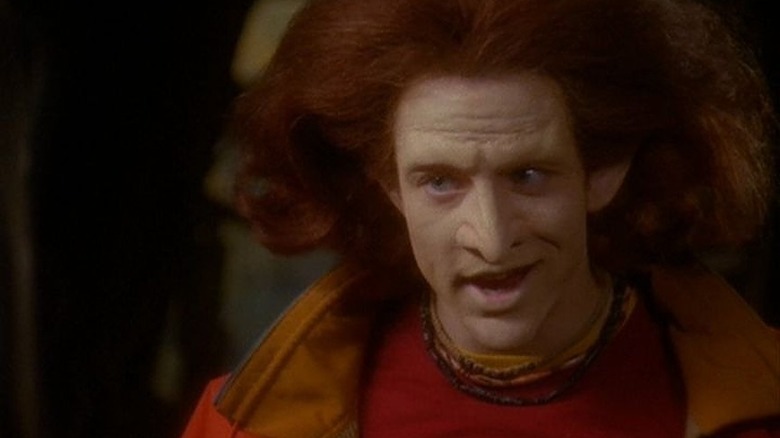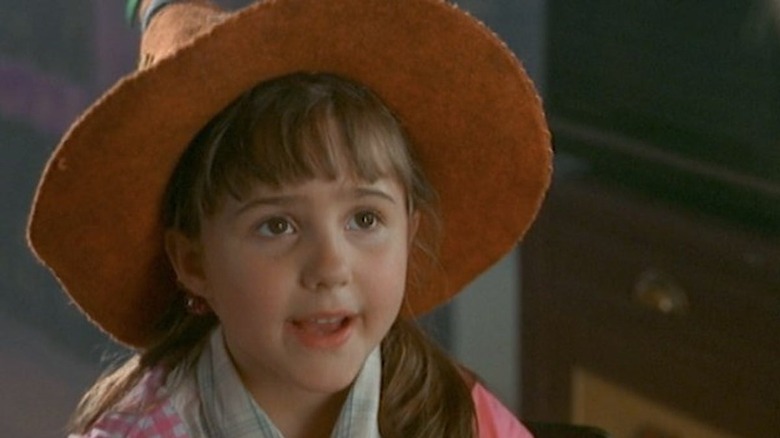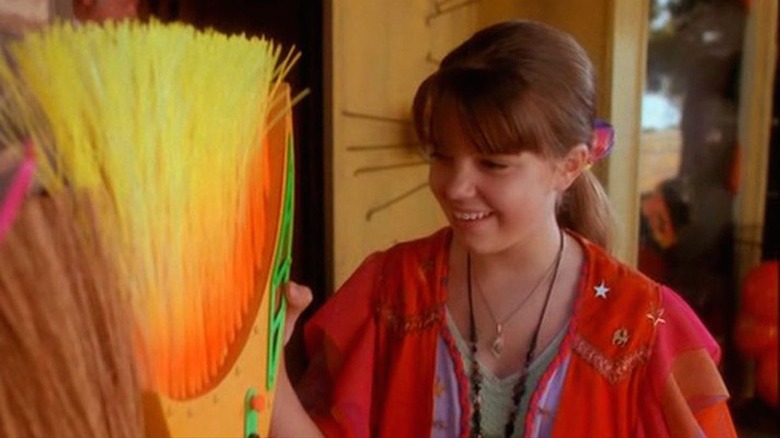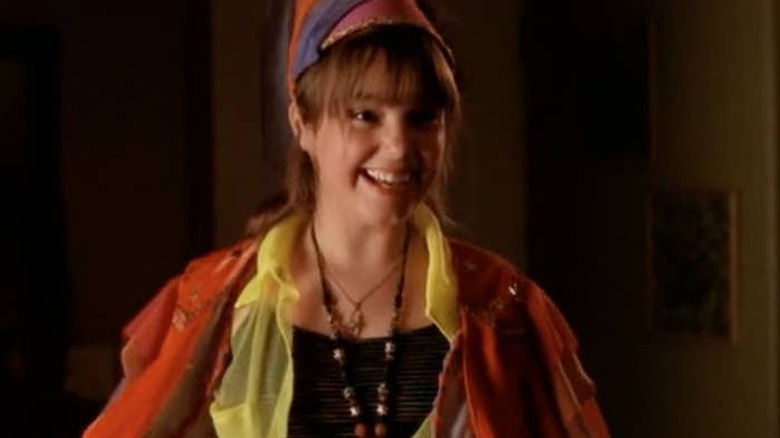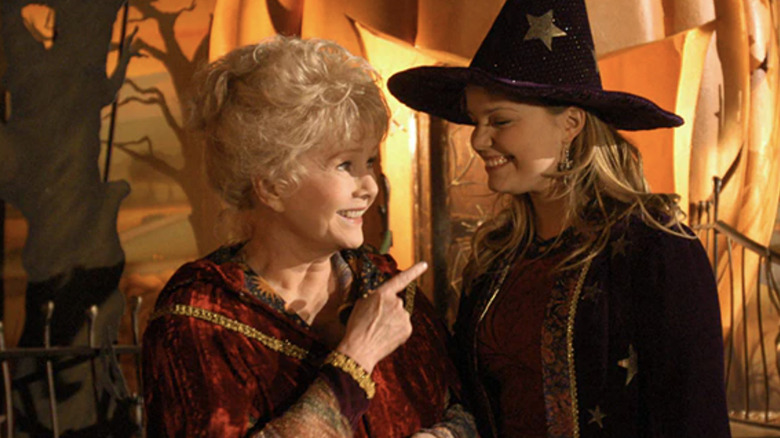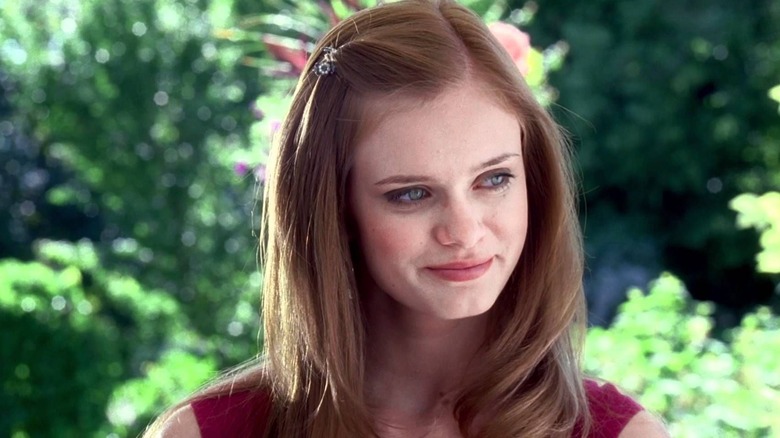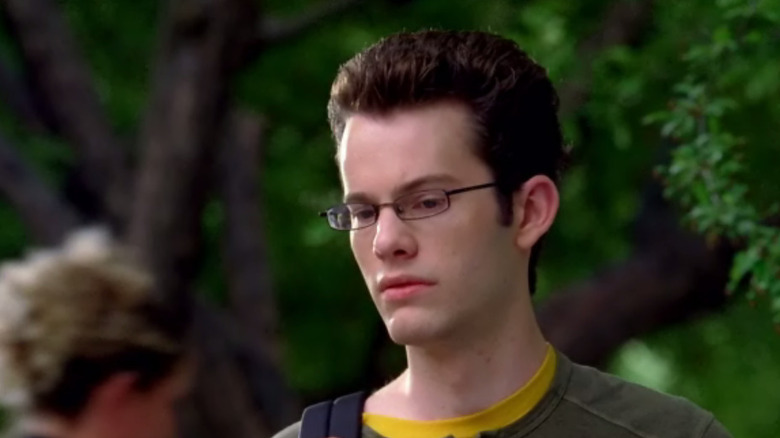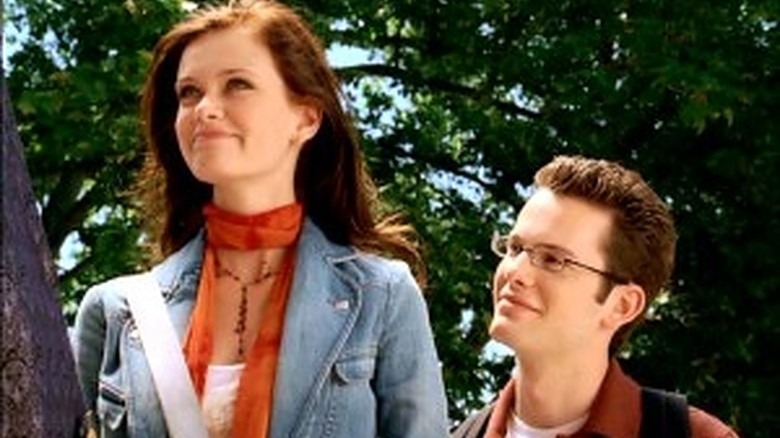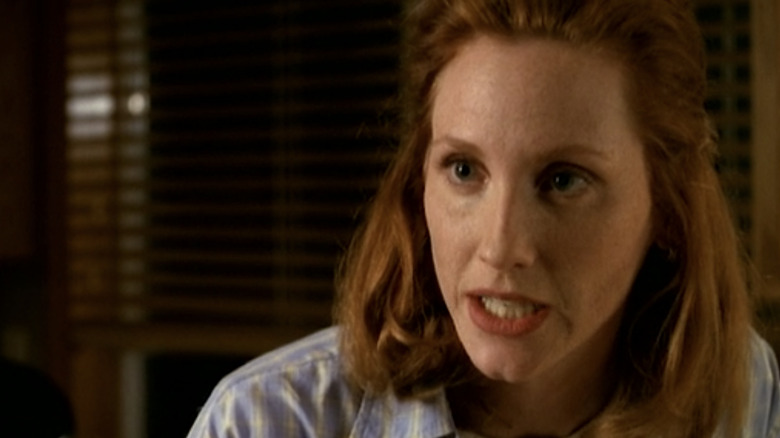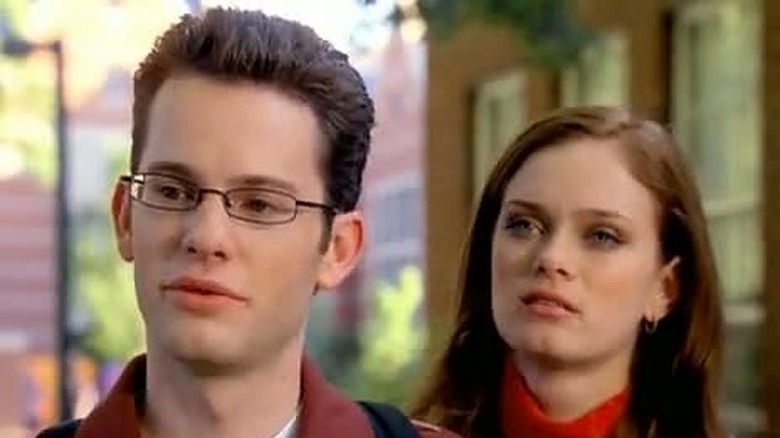Questionable Things We Ignored In The Halloweentown Movies
Disney Original Movies are the highlight of most '90s and early '00s kids' childhoods, but sometimes, analyzing them as adults ruins a bit of the magic. That's certainly the case for the "Halloweentown" franchise — a not-so-spooky favorite of many kids that felt just a bit different growing up. Grandma Aggie's (Debbie Reynolds) quote, "Being normal is vastly overrated," still rings out in the hearts of most kids who grew up watching the series. However, with each post-adolescence rewatch comes more gut-wrenching blows that the film series isn't as perfect as we remember.
The films center around the three young Piper (Cromwell) kids Marnie (Kimberly J. Brown), Dylan (Joey Zimmerman), and Sophie (Emily Roeske). The kids navigate their newfound witch powers, much to the disdain of their mother Gwen (Judith Hoag) and the delight of their kooky Grandma Aggie. Taking place in part in another realm called "Halloweentown," the film's upbeat soundtrack is seared on the souls of '90s kids who fondly recall a better time. Yet, that better time still had its issues.
Between major continuity problems, missing characters, chaotic world-building, and sketchy subliminal messages, there are some truly questionable things about "Halloweentown" that we've ignored. Nevertheless, we're still ready to get in Benny's cab and go along for the ride every Halloween.
Superficiality is the name of the game
On the surface, "Halloweentown" makes itself seem like a profoundly inclusive film that preaches acceptance and tolerance — and to some extent, it is. But look a little deeper at some of the not-so-subtle messaging the series puts forth, and that tagline seems further and further from reality.
When we first meet Luke, for instance, he's in a false human form because he's ashamed of what he looks like in his natural goblin look. Okay, that's reasonable. He's a tween after all — and what kid doesn't have significant insecurities? The first film leaves us with the gist that we should accept and love ourselves — until the sequel entirely rewrites that premise.
The minute Luke becomes a genuine love interest for Marnie and not just a kid with a crush on her, he receives a total overhaul of his striking features that are too drastic to chalk up to natural puberty. His nose drastically slims down, his face entirely smooths out, and his ears are much smaller. Why? Because Marnie can't possibly be interested in someone who looks too different. His updated look makes him entirely human-ish, all in an effort to tease a Marnie/Luke relationship that never goes anywhere.
Later, we later see a similar emphasis on superficiality when Dylan is scandalized by the discovery of Natalie's authentic pink troll appearance later in the series. They kiss, and they both call it weird. Why tease something you're going to later backtrack on and stigmatize?
Kal's return is falsely teased
"Halloweentown II: Kalabar's Revenge" sets up Kal (Kalabar's equally shifty son) as the series' new most significant villain. In "Halloweentown," Kalabar dupes the entirety of Halloweentown with his ploy to take over the hidden realm; after taking down the duplicitous mayor, a new villain pops out of the woodwork, and he just so happens to be the mayor's son.
Though Marnie defeats him in the end (no surprise there), unlike Kalabar, he disappears with a threat. Luke even ominously says that they'll see him again, but we never do. The franchise sets up a significant number of angles and plotlines that are never addressed again, making an otherwise delightful series somewhat grating. In fact, even the name of the second film is misleading.
Sure, Kalabar is getting his revenge through this mysterious son no one knew existed, but fans were expecting the OG Kalabar to show up — and instead, we get the Sweet 'N Low version with Kal. What did Kalabar need Luke for in the first film if he had a son the entire time? The plotlines just don't add up — but it's a whole lot easier to look past when you're a kid.
Who is Gwen's dad?
We never discover the identity of Gwen's dad, which is weird because Aggie is over 1,000 years old. Given the absurd lifespan of witches and warlocks, it doesn't seem like death is all that common in Halloweentown. Additionally, it's unlikely that Aggie would go for a mortal, given how confused she is about the mortal world before living with Gwen.
If Aggie did have Gwen with a mortal, Kalabar would never have been interested in Gwen. In the first film, he throws the Halloweentown equivalent of slurs at Gwen's kids for being half-mortal. It's pretty bizarre that no one even mentions Gwen's dad, at the very least. They don't run into him at Halloweentown, given how seemingly small it is. What's the deal here? And why does this franchise think that by not mentioning things, they cease to exist? The plot holes in the "Halloweentown" movies, it seems, are deadlier than Kalabar's hand magic.
Luke disappears with no word
Keeping with a theme, if no one mentions an integral plot point, it seems to cease to exist in the "Halloweentown" universe. After building up a potential romance between Luke and Marnie for the first two films, he disappears, never to be mentioned again. When Marnie heads back to Halloweentown in the second film, she goes through great pains to make sure Luke is safe when Kal turns the town grey — and they spend the entire time working together (and mildly flirting) in their attempts to stop Kal.
Given how integral he is to the series and how much Marnie cares about him (whether it's platonic or otherwise), it makes zero sense that he doesn't show up in the third and fourth films. We see Luke's longing to be a human in the first movie, so there's no way he wouldn't take advantage of the Halloweentown high school exchange program to the mortal realm. Even more, when Marnie attends Witch University in the fourth movie, she would undoubtedly seek out her best Halloweentown friend instead of consuming herself with Ethan. It would have taken zero effort to chuck in a throwaway line that his parents wouldn't let him enter the exchange program or that he was attending college in the mortal realm during the fourth film to explain his absence. Instead, no one ever mentions him again, so he must not exist.
What even is this timeline?
Could someone please explain the "Halloweentown" timeline, super slowly? It doesn't even seem like the writers know how much time has passed between films. While the events between the first and second movies seem to be a single year apart (both taking place on Halloween), the second to third film jump is murkier.
The third film begins with Marnie's summons from the Halloweentown Council, implying that it takes place directly after the events of the second movie. After all, the Council summons Marnie for creating a new portal (and saving Halloweentown), so why would that occur a year after the events?
Perhaps even more confusing, Sophie is still a young child in the "Halloweentown" sequel, yet it looks like years have passed between then and how she appears in the third movie. The age jump makes sense because, of course, actress Emily Roeske aged in real-time. However, when you have actors that don't fit into the story's ages, it's up to the writers to craft a story that works for the actors. Unlike our favorite Cromwell witches, the actors who portray them can't magically make themselves younger.
The fate of teens are in a teen's hand
When you think of the appropriate person to head up an integration program between two separate realms, a teenager shouldn't come to mind. Okay, so Marnie creates the portal that allows people to come and go between Halloweentown and the mortal realm, but that doesn't exactly qualify her to run the mystical equivalent of a foreign exchange program. And sure, Aggie is there to help, but she causes more problems than she fixes.
At the end of the day, Marnie is a teenager who gets easily distracted by the dismal taste in boys that divert from her intuitive senses. Did everyone forget how her infatuation with Kal almost ended the world? Let's face it: The events of the second and third movies would not have happened if Marnie hadn't spend so much time lusting after boys. Sure, she's strong, but she's also a teenager, and we can't even blame her for the distraction — blame the adults for putting her in that position.
It should be Gwen heading up the movement, as she's the most experienced with both mortal and Halloweentown business. Instead, the fate of both realms lies in the hands of a teenager and a 1,000-year-old grandmother — both of whom are too preoccupied with boys to do the job adequately. It's wild that Marnie's mom treats her like a child while leaving the fate of children in her hands. Pick a broom lane, lady.
Magical inconsistencies
Much like the timeline and plotline inconsistencies, the rules of the series' magic make absolutely no sense. Marnie often goes from being unable to perform basic spells to demonstrating incredible feats of power and spellwork that impress even the most advanced witches and warlocks in the universe. In "Halloweentown II," she manages a powerful time travel spell in a foreign language from memory. She later dismantles the timed portal that's existed in Halloweentown for 1,000 years — installing an at-will portal in its place. That's pretty advanced stuff for a witch who has barely begun her training.
Yet in "Halloweentown High," Marnie can't even do a simplistic level 2 home renovation spell, giving up in a fit of frustration after she shrinks the house instead of expanding it. Sure, her significant magic feats are typically under pressure situations, since the fate of the world(s) is so often in her hands. But, when a witch can undo a 1,000-year-old spell with her own on-the-spot spell, it's hard to believe that her untapped natural talent wouldn't crossover in a more significant way. The movie also sees the Cromwells lose their magic — and then somehow use their lost magic to recover the magic they lost. Wait, what?
Aggie is majorly out of character in movie 3
The first two films set Aggie up as the mildly irresponsible, slightly aloof, magically-proficient grandma who adores and is adored by her grandchildren. Yet, there's a difference between being a little kooky and being downright irresponsible. In the fourth film, we learn that Aggie is, in fact, over 1,000 years old — making her childish outbursts in the third film that much more cringe-worthy and out of character.
At the mere prospect of losing her magic, Grandma Aggie gets hostile toward Marnie, who made a bet (as a figure of speech) that humans had changed enough to accept the creatures from Halloweentown instead of hunting them down. It's clear that magic means everything to Aggie, but Marnie is already miserable about her doomed deal. Instead of helping Marnie fix the situation, Aggie is too busy pouting and making eyes at the real Knight — the very person threatening Marnie's deal to make the mortal realm seem unsafe. Clearly, awful taste in men runs in the Cromwell family, but you'd expect someone over 1,000 to be a little more capable of seeing through facades and not allowing a crush to consume you. Eventually, Aggie and Marnie make up, but the whole plot is a bit much.
Marnie is replaced
It's no secret that original Marnie actress Kimberly J. Brown is the world's most passionate "Halloweentown" fan, so fans knew that when her role was recast in "Return to Halloweentown," she didn't have much choice in the matter. It's unclear what exactly went into that decision, but Brown noted in a 2016 interview with Seventeen that she didn't make the call and would love to continue playing Marnie.
We'll likely never know the straight story: perhaps Disney was looking for a different actor to portray a grown-up Marnie; perhaps a filming conflict was the cause; perhaps it was something else entirely. However, many fans feel that the switch negatively impacted the series.
Honestly, what's the point of a fourth movie with a new actress? No one asked for a change in actresses. Moreover, this is a fantasy world, and they replaced her with someone who looks nothing like Brown. Why not explain the switch by magical means? Maybe she got hexed, it was a spell gone wrong, or she added an incorrect ingredient to a potion. Magic offers so many possibilities to explain away such inconsistencies — but instead, the onus is on the audience to pretend like they don't exist.
Gwen treats her children differently
Gwen holds her children to very different standards, and it impacts each of them differently. Even when Marnie was a teenager, Gwen wouldn't let her eldest daughter go off and train with Aggie. Not only does she deny her daughter the right to honor her heritage, she almost takes the choice away from her completely. If a witch comes of age before flexing her magic, she loses it forever (what a thing to decide for another human being!), child or no child.
Gwen's refusal to let Marnie live in Halloweentown is mildly understandable in the first and second films, given the fact that she'd only be able to see her on Halloween. Yet after Marnie revamps the portal, there's really no excuse — and Gwen still gives her a hard time about practicing magic. Even when Marnie is over 18, Gwen's overbearing tendencies are absurd. Meanwhile, she's perfectly fine letting her younger daughter go off with Aggie doing dangerous magic like inter-dimensional time travel. Then, time and time again, Dylan is forced to abandon his own needs to babysit his older sister unnecessarily.
Dylan deserves autonomy
For some reason Dylan, Marnie's younger brother, goes to college with her in a magical university in Halloweentown. Sure, the plot hole is (kinda) filled in midway through, when Marnie makes an offhanded comment about Dylan graduating early — but that's just it. Under no circumstances would Dylan choose to go to Witch University when he could get in anywhere. With a deep interest in academics (and little to no interest in warlocking), Dylan had the opportunity to make a difference in the world in his own way instead of Marnie's. But Gwen is more than happy to take that away from him.
Instead, Gwen decrees that her daughter, who receives a full ride, cannot attend college in Halloweentown on her own. We all know that Dylan is a goody-two-shoes, so of course, he won't decline his mother's request. Even weirder, it doesn't even seem like Dylan applied, since the Dean doesn't know who he is. How exactly does Dylan crash the school? It's pretty shifty that their mom forces her son to give up his dreams because of her weird back-and-forth opinions on magic and Halloweentown and inability to trust her eldest daughter, even though she has proven herself time and again.
Gwen's ideas on magic are erratic and inconsistent
Gwen's mercurial views towards magic change at the drop of a witch's hat — hypocritical at best, downright negligent at worst. Kids hate it when parents say "Do as I say, not as I do," yet Gwen seems to live her life by that rule as we watch her toggle back and forth between approving of her kids using magic and wanting absolutely nothing to do with it.
Gwen realizes that her children are good kids, who frequently save the world and are responsible enough to use magic with guidance; she even typically finds some of her own joy in rediscovering her heritage. Then, every new movie begins with some carefully placed amnesia that makes her entirely forget such character growth, once again scolding Marnie for using the same powers that Gwen often finds herself displaying.
Most egregiously, she chastises an 18-year-old Marnie at the beginning of the fourth film for using magic in the comfort of her own home as Marnie simply uses it to sort clothes. Yet, after all of her children have left the nest, Gwen carelessly uses magic in front of mortals for self-serving reasons. Whether she's trying to sell a house or having a meltdown in front of a helpless grocery store clerk, she's causing mayhem of all sorts in public.
Marnie trusts the wrong warlock (surprise!)
Marnie's intentions are usually benign, but her frequent mistrust in the wrong people causes nearly all of the near apocalypses that she's tasked with stopping. Is it really all that impressive when you fix your own mistake? Yet time and time again, Marnie fails to learn from the dismal results of her faulty trust radar.
However, it turns out Marnie isn't just awful at discerning the intentions of men she wants to date — it extends to her family, too. We spend the entire fourth film watching Dylan fawn over the three awfully vapid Sinister sisters who use him for his intelligence. That's not exactly a good look for someone as brilliant as Dylan — but book smarts and people smarts are often at odds.
In another instance of Marnie needing to clean up her own mess, she pretends to destroy a gem that can take over the world by making anyone and everyone do their bidding. Aggie locked the pendant away a thousand years before saving the world from misplacing its power. But Marnie makes yet another terrible choice when she saves the gem, giving it to Dylan — you know, the guy who just spent the whole film getting manipulated? Yeah, that one. And where does he hide it? A book. As if no one would think to look there.
This whole family is hopeless. The moment is clearly setting up a possible sequel that never happened, but you'd hope that Marnie would have learned her lesson by now.
